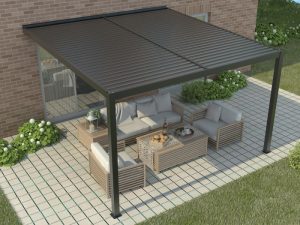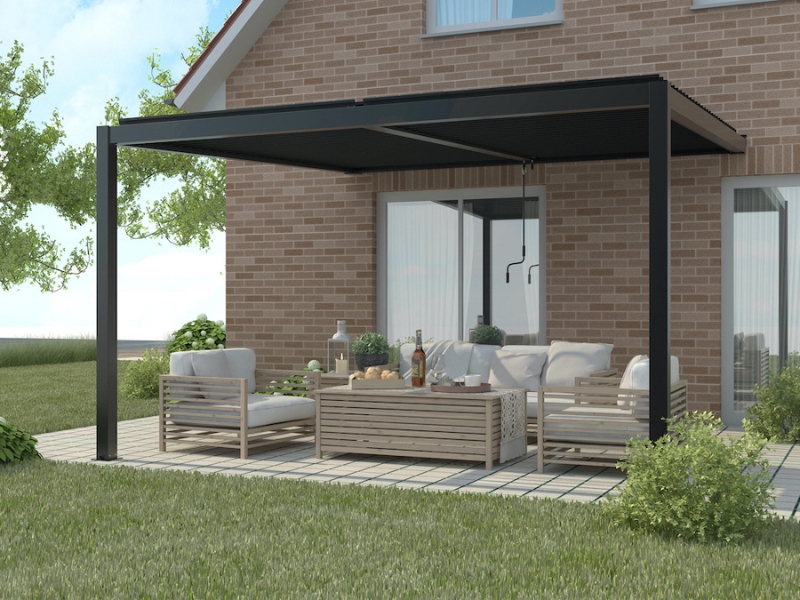A wall mounted pergola can transform your outdoor space by providing shade, privacy, and aesthetic appeal. But before you dive into installing one, you might wonder — does a wall mounted pergola require a concrete foundation? The answer depends on the pergola’s size, weight, and intended use. This guide explores the options and helps you make the right choice for your outdoor project.
What is the purpose of a foundation for a wall pergola?
A foundation serves as the structural base for a pergola, ensuring stability and longevity. Even though wall mounted pergolas are anchored to an external wall, the support posts often require a solid foundation to bear weight and resist external forces.
Key purposes of a pergola foundation:
- Stability and support: A solid foundation prevents the pergola from shifting or tilting over time. It also ensures that the structure remains secure in all weather conditions.
- Weight distribution: Spreads the pergola’s load evenly to avoid structural stress. Proper weight distribution prevents sagging or uneven settling over time.
- Weather resistance: Protects against soil movement caused by wind, rain, and temperature changes. It helps maintain the structural integrity of the pergola despite changing environmental conditions.
- Safety: Stable foundations reduce the risk of accidents caused by unstable installations. They also minimise hazards, making your outdoor space safer for family and guests.
What are the best foundation options for a wall-mounted pergola?
Depending on your outdoor space and the pergola design, several foundation options can be considered:
Foundation Type | Pros | Cons |
Concrete Footings | Durable and strong | Requires excavation and curing |
Pavers on a Gravel Base | Aesthetic and easy-to-install | Less sturdy than concrete |
Decking Frame | Ideal for raised decks | It may require additional bracing |
Ground Anchors | Quick and cost-effective | Not suitable for heavy pergolas |
When is a concrete foundation required for a wall pergola?
A concrete foundation is often necessary when the pergola’s structure or environment demands extra strength and stability. Consider the following situations:
- Larger pergolas: Structures over 3 metres wide need reinforced support. A concrete foundation prevents sagging and maintains structural integrity.
- Motorised louvered pergolas: A sturdy base is required to support the motorised mechanism. The added weight and movement of motorised louvers demand a secure and immovable foundation.
- High-wind areas: Prevents movement or tilting during strong winds. A concrete base anchors the pergola firmly, reducing the risk of structural damage caused by shifting or excessive force. To further enhance stability, explore the principles of wind load resistance in architectural structures.
- Unstable soil conditions: Concrete foundations minimise the risk of sinking or uneven settling. They provide a reliable base that compensates for soil movement or erosion.
Can you use alternative foundations for wall pergolas?
While concrete foundations offer the most stability, alternative foundation methods can sometimes be suitable, especially for smaller or lightweight pergolas.
Alternative Option | Stability | Ease of Installation | Cost |
Gravel Base | Moderate | Easy | Low |
Paver Stones | High | Moderate | Medium |
Decking Frame | High | Hard | High |
Post Anchors | Moderate | Easy | Low |
What are the risks of installing a pergola without a proper foundation?
Skipping a proper foundation may save time and money initially but can lead to costly repairs or safety hazards down the line. An unstable pergola can compromise the integrity of your outdoor space. Potential risks include:
- Structural instability: Pergola may tilt, sink, or collapse. Without a solid foundation, even minor shifts can weaken the structure.
- Damage to property: Movement or shifting can damage adjacent walls, leading to costly repairs and compromising the safety of nearby structures.
- Injury risk: There are increased chances of accidents, especially in high winds. Falling structures or loose components can be hazardous to people nearby.
- Shortened lifespan: Lack of a strong base reduces the pergola’s durability. A weak foundation accelerates wear and tear, leading to premature failure.
To avoid these risks, investing in a high-quality, well-supported pergola is essential. Learn more about durable and stylish wall mounted pergola solutions designed for long-lasting stability and effortless elegance.
Does the foundation type affect the longevity of the wall pergola?
Yes, the type of foundation directly impacts the lifespan and performance of a wall mounted pergola. A solid and durable foundation ensures your pergola remains structurally sound for years.
How foundation type impacts longevity:
- Concrete foundations: Offer maximum lifespan, lasting 10-20+ years.
- Concrete footings: Provides longevity of 10-15 years with proper maintenance.
- Paver base: This may last 5-10 years but requires regular realignment.
- Ground spikes: Least durable, lasting only 3-5 years under ideal conditions.
How do you choose the right foundation for your pergola?
Choosing the right foundation depends on the pergola’s size, intended use, and environmental factors. Following a simple decision-making process helps ensure optimal stability and longevity.
Factors to consider:
- Pergola size and weight: Larger or motorised pergolas need a concrete foundation.
- Soil conditions: Unstable or sandy soil requires deeper support to ensure long-term stability. To achieve this, find out how deep pergola footings need to be for different soil conditions.
- Climate and weather exposure: High-wind or heavy rain areas need reinforced foundations.
- Intended use: High-traffic areas benefit from a solid foundation to prevent wear.
Decision checklist:
- Assess pergola size and weight.
- Check soil type and stability.
- Consider climate and exposure.
- Match foundation type to intended use.

What are the common mistakes in pergola foundations?
Avoiding foundation mistakes can save you time, money, and future headaches. Many DIY enthusiasts overlook crucial aspects when installing wall mounted pergolas.
Common mistakes include:
- Skipping soil assessment: Leads to foundation shifting or sinking.
- Inadequate depth of footings: Results in structural instability, making it essential to understand why pergola posts need to be anchored securely.
- Improper drainage: Causes water buildup and weakens the foundation.
- Using lightweight anchors for heavy pergolas: Compromises long-term stability.
How to avoid these mistakes:
- Test soil stability: Conduct a soil test before choosing a foundation.
- Ensure proper footing depth: Dig at least 30-60 cm deep for stability.
- Add drainage solutions: Prevent water accumulation to protect the foundation.
Conclusion
Choosing the right foundation ensures that your wall mounted pergola remains secure, stylish, and durable for years to come. Whether you prefer a concrete base, paver stones, or ground anchors, it’s essential to select the option that best suits your space. For expert advice and assistance, ask Unique Pergolas about DIY pergola kits and installation support.


